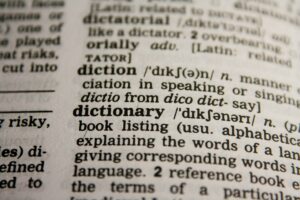Wednesday, October 25th, 2017...9:54 pm
Fact: Dictionaries describe, not prescribe.
Yin Liu
Fallacy: Dictionaries regulate language.
Because I am the U of S English Department’s default ‘language’ person, questions by the general public about dictionaries usually get passed on to me. Once I was interviewed by a reporter about the latest edition of some dictionary — I think it was Merriam-Webster’s — and the words that had been added to it. The reporter wanted to know whether I thought it appropriate that words like sexting should be in ‘the dictionary’. This confronted me with such a wall of misconceptions that I didn’t know where to start busting them. Now that there is no longer a reporter in my office stressing me out, I’ll tackle the false assumptions one by one.
- There is no such thing as ‘the dictionary’. There are dictionaries. They are compiled by human beings (lexicographers) in specific historical and social contexts. Every dictionary for a living language is outdated the moment it is published, because a living language, by definition, changes constantly. Therefore there is no way that any dictionary can be completely authoritative, the last word on anything. Furthermore, all dictionaries are different. There may be words that appear in one dictionary but not in another. There will be differences in the wording of definitions, and even in the meanings (‘senses’) ascribed to particular words. British, US, Canadian, Australian dictionaries will reflect the lexicon, pronunciation, and usage of their regional English dialects. Different dictionaries will also have different protocols for making fundamental decisions, such as what words to include.
- All, or almost all, credible English dictionaries published today are descriptive, not prescriptive. That means they are not intended to tell you how to use English; they tell you how English is used. They aren’t like police officers; they’re more like sociologists. They aren’t intended to control language use, but to describe it. Now this is very different from the way dictionaries are often used by the confused public: as authorities to be consulted when there is a dispute over what a word is supposed to mean, how a word is spelled, or even whether something is a word at all. You’ve probably all been there: you’re playing a word game or having a heated political argument and someone suggests that you look up a word in ‘the dictionary’ to settle the dispute once and for all, expecting that the debaters will meekly submit to the authority of ‘the dictionary’. This is precisely the way lexicographers hope you won’t use their dictionaries. English dictionaries today are not meant to regulate language use.
- In my interview with the reporter, I wanted to talk about the introduction of the word earworm to the latest edition of that particular dictionary, because I think it’s a very interesting word (it’s an example of a calque from German Ohrwurm [OED s.v. earworm, n1]). But the reporter insisted on discussing sexting, because he seemed to think that it was a controversial word to include in a dictionary. Possibly he was channelling social anxiety that the inclusion of this word in ‘the dictionary’ might somehow imply acceptance of the activity to which the word refers. But this is an absurd idea. It’s like saying that eliminating the word murder from dictionaries will stop people from killing each other. If English speakers are using the word sexting, it’s the job of a lexicographer to include it in a dictionary. Whatever the lexicographer’s personal opinions are about the linguistic qualities of the word or the social value of the idea it refers to, those opinions have nothing to do with lexicography. If a dictionary is not intended to be a linguistic cop, much less is it intended to be a social cop.
- Possibly another reason for the reporter’s anxiety is the idea that new words should appear in a dictionary at all. If one of the functions of an English dictionary is to lay down the law about what is English and what isn’t, then it may be disturbing that new words — especially from informal registers, like slang — can be included in dictionaries. Honestly, if words like sexting appear in dictionaries, what will be next? The collapse of civilisation? But the function of dictionaries is not to lay down the law. Ironically, the origin of English dictionaries was a result of new words entering the English language. In the 1600s, when the first monolingual English dictionaries appeared, a flood of new words was entering the language — partly as a result of English speakers coming into contact with more languages and more experiences they didn’t have words for, and partly because borrowing words from Greek and Latin had become a way of showing social superiority. Because English speakers were feeling overwhelmed by all these new words that made them feel stupid, dictionaries appeared to tell English speakers and readers the meanings of new words in their own language. English dictionaries exist because of new words. Again ironically, dictionaries have become so comprehensive and labour-intensive to create and maintain that, by the time a word appears in a published dictionary, it’s probably no longer new.
Dictionaries are wonderful tools for studying language. But use them the way they were intended: to study language use, not to restrict it.
Works Cited
[OED] Oxford English Dictionary Online. Oxford University Press, 2017. www.oed.com. Accessed 25 October 2017.
Comments are closed.